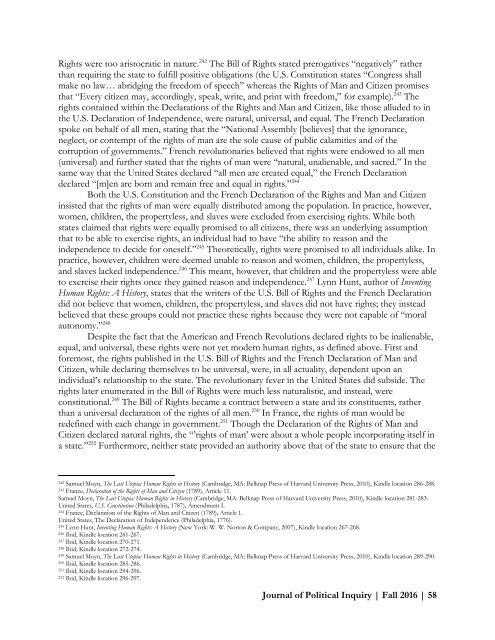Fall2016_Final2
You also want an ePaper? Increase the reach of your titles
YUMPU automatically turns print PDFs into web optimized ePapers that Google loves.
Rights were too aristocratic in nature. 242 The Bill of Rights stated prerogatives “negatively” rather<br />
than requiring the state to fulfill positive obligations (the U.S. Constitution states “Congress shall<br />
make no law… abridging the freedom of speech” whereas the Rights of Man and Citizen promises<br />
that “Every citizen may, accordingly, speak, write, and print with freedom,” for example). 243 The<br />
rights contained within the Declarations of the Rights and Man and Citizen, like those alluded to in<br />
the U.S. Declaration of Independence, were natural, universal, and equal. The French Declaration<br />
spoke on behalf of all men, stating that the “National Assembly [believes] that the ignorance,<br />
neglect, or contempt of the rights of man are the sole cause of public calamities and of the<br />
corruption of governments.” French revolutionaries believed that rights were endowed to all men<br />
(universal) and further stated that the rights of man were “natural, unalienable, and sacred.” In the<br />
same way that the United States declared “all men are created equal,” the French Declaration<br />
declared “[m]en are born and remain free and equal in rights.” 244<br />
Both the U.S. Constitution and the French Declaration of the Rights and Man and Citizen<br />
insisted that the rights of man were equally distributed among the population. In practice, however,<br />
women, children, the propertyless, and slaves were excluded from exercising rights. While both<br />
states claimed that rights were equally promised to all citizens, there was an underlying assumption<br />
that to be able to exercise rights, an individual had to have “the ability to reason and the<br />
independence to decide for oneself.” 245 Theoretically, rights were promised to all individuals alike. In<br />
practice, however, children were deemed unable to reason and women, children, the propertyless,<br />
and slaves lacked independence. 246 This meant, however, that children and the propertyless were able<br />
to exercise their rights once they gained reason and independence. 247 Lynn Hunt, author of Inventing<br />
Human Rights: A History, states that the writers of the U.S. Bill of Rights and the French Declaration<br />
did not believe that women, children, the propertyless, and slaves did not have rights; they instead<br />
believed that these groups could not practice these rights because they were not capable of “moral<br />
autonomy.” 248<br />
Despite the fact that the American and French Revolutions declared rights to be inalienable,<br />
equal, and universal, these rights were not yet modern human rights, as defined above. First and<br />
foremost, the rights published in the U.S. Bill of Rights and the French Declaration of Man and<br />
Citizen, while declaring themselves to be universal, were, in all actuality, dependent upon an<br />
individual’s relationship to the state. The revolutionary fever in the United States did subside. The<br />
rights later enumerated in the Bill of Rights were much less naturalistic, and instead, were<br />
constitutional. 249 The Bill of Rights became a contract between a state and its constituents, rather<br />
than a universal declaration of the rights of all men. 250 In France, the rights of man would be<br />
redefined with each change in government. 251 Though the Declaration of the Rights of Man and<br />
Citizen declared natural rights, the “’rights of man’ were about a whole people incorporating itself in<br />
a state.” 252 Furthermore, neither state provided an authority above that of the state to ensure that the<br />
242<br />
Samuel Moyn, The Last Utopia: Human Rights in History (Cambridge, MA: Belknap Press of Harvard University Press, 2010), Kindle location 286-288.<br />
243<br />
France, Declaration of the Rights of Man and Citizen (1789), Article 11.<br />
Samuel Moyn, The Last Utopia: Human Rights in History (Cambridge, MA: Belknap Press of Harvard University Press, 2010), Kindle location 281-283.<br />
United States, U.S. Constitution (Philadelphia, 1787), Amendment I.<br />
244<br />
France, Declaration of the Rights of Man and Citizen (1789), Article 1.<br />
United States, The Declaration of Independence (Philadelphia, 1776).<br />
245<br />
Lynn Hunt, Inventing Human Rights: A History (New York: W. W. Norton & Company, 2007), Kindle location 267-268.<br />
246<br />
Ibid, Kindle location 261-267.<br />
247<br />
Ibid, Kindle location 270-271.<br />
248<br />
Ibid, Kindle location 272-274.<br />
249<br />
Samuel Moyn, The Last Utopia: Human Rights in History (Cambridge, MA: Belknap Press of Harvard University Press, 2010), Kindle location 289-290.<br />
250<br />
Ibid, Kindle location 285-286.<br />
251<br />
Ibid, Kindle location 294-296.<br />
252<br />
Ibid, Kindle location 296-297.<br />
Journal of Political Inquiry | Fall 2016 | 58
















